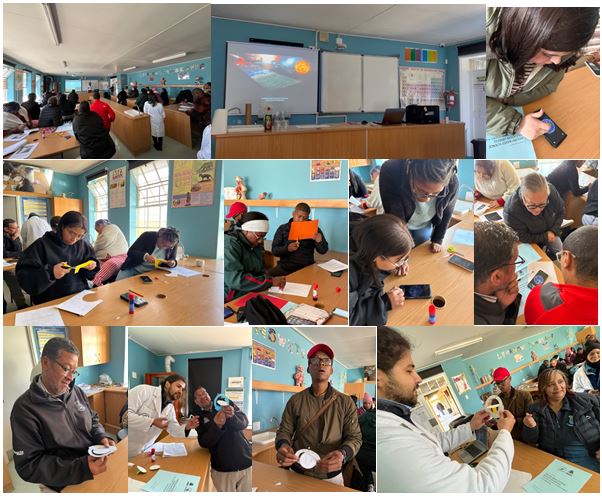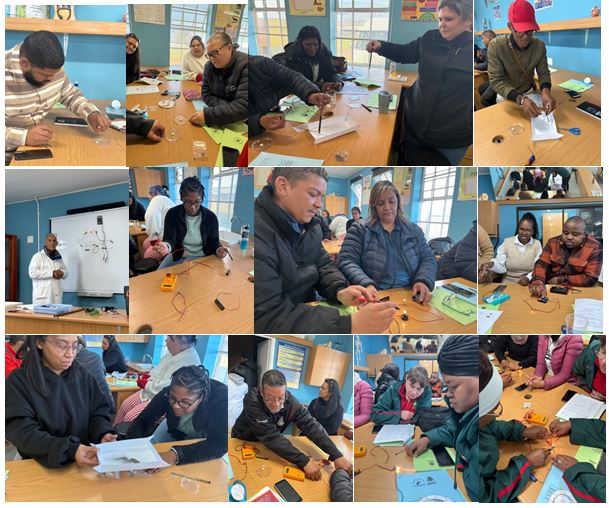Advancing Knowledge NPC’s professional development sessions for natural sciences teachers concluded their 2025 delivery in the Overberg Education District of the Western Cape Education Department. A total of 25 Intersen (grades 4-7) teachers braved the bad weather on the weekend of August 1, 2025, to attend the SACE-endorsed course, Inquiry-Based Science Education. The course, which included both physics (energy & change) and astronomy (planet earth & beyond), covered curriculum knowledge areas taught in the third and fourth terms of the school year. The training took place in the science laboratory of De Rust Futura Academy in Grabouw. This STEM Teaching and Learning Centre (STEM TLC) was constructed through a partnership between AK NPC, the Garden Cities Archway Foundation, and the Western Cape Education Department.
The core philosophy of Advancing Knowledge NPC’s ongoing professional development is an inquiry-based approach, which includes hands-on, practical, and experimental application of curriculum content. The sessions, therefore, prepared teachers for the third (physics) and fourth (astronomy) term’s content. Teacher participation was arranged in collaboration with the district’s science subject advisor, Mr. Jandre Gerber. The facilitators were Mr. Robert Solomon (energy & change) and Mr. Andrew Firth (planet earth & beyond). They were assisted by AK NPC staff: science interns Saadiqah Fraden, Somila Dlakavu, and Yusra Joubert, as well as projects coordinator Melissa Petersen. Professor Shaheed Hartley, Director of AK NPC, welcomed the teachers and urged them to apply the inquiry skills learned in the course to their daily physics and astronomy lessons.
EXPLORING PLANET EARTH & BEYOND
Teachers received a guided tour of our home planet, Earth, and then explored the celestial bodies that influence it in various ways, including weather, tides, seasons, day, night, and eclipses. Software and applications were loaded onto the teachers’ phones and laptops, providing them with a detailed understanding of the solar system’s planets and content they could easily use in their lessons. The teachers’ journey into outer space included the various components of our solar system, the Milky Way, and nearby galaxies. They were provided with hands-on activities and teaching resources to determine the phases and positions of the moon, the effect of the moon on tides and seasons, and to construct a sunometer. Facilitators constructively engaged the teachers through creative, hands-on, inquiry-based activities. The interactive nature of the sessions was specifically designed to allow teachers to ask questions and try the activities on their own.

- “This was a very interesting session. I had so many questions for the facilitator that I’m sure my learners will be asking me.” [Teacher]
- “Activities like making a sunometer and applying it to the seasons are definitely something I will do with learners in my science class. This workshop is so practical, and we can translate the activities directly into our classrooms. It’s a pity it was only for such a short time.” [Teacher]
- “The apps we used will definitely help with astronomy in the classroom, as learners will have the opportunity to use their cell phones for schoolwork. The workshop was very helpful for teaching this area. I never thought of these activities to assist my teaching of this curriculum topic.” [Teacher]
ADVANCING PHYSICS TEACHING FOR THE INTERSEN (GRADES 4-7) PHASE
Teaching physics to many intermediate phase (grades 4-6) teachers presents a unique challenge: moving them beyond simply knowing what they have to teach and what learners need to know. The goal is to equip them with a deeper, more advanced understanding of the subject matter.
This is exactly what experienced facilitator Robert Solomon aimed to do. He challenged teachers’ current understanding of electricity, electric circuits, magnetism, electromagnetism, and forces—all key components of the natural sciences curriculum’s “energy and change” section. Solomon enhanced the complexity of the content, encouraging teachers to think critically about their own understanding. For example, he prompted them to consider, “What happens to the light bulb, the resistance, and the current if you add or subtract the voltage of the circuit?” Through an inquiry-based approach, the session’s activities had a cumulative effect. They not only provided hands-on experience but also deepened the teachers’ own grasp of the content.

- “This was a challenging workshop that made us think about what we’re doing. You have to watch the multimeter to see how the current and voltage change when you put cells and resistors in series and parallel. It was a very intensive session.” [Teacher]
- “We went beyond what we would normally do as part of the curriculum, but it was interesting once you get over your own insecurities. He certainly won me over in the end because now I’m aware of what comes next by practically changing things in the circuit and measuring it with the multimeter.” [Teacher]
- “It was an interesting and challenging workshop. What I liked was that we could work it out ourselves, first theoretically and then practically by doing it at the table. I will definitely try this out with my learners.” [Teacher]
- “The session caught some teachers off guard. It was a good test to go a little beyond what they know and are used to, into the next level. It started with their own understanding and then stepped up from there. I think that’s an important part of a teacher’s professional development.” [Science Subject Advisor]
This project was made possible by a partnership between the Advancing Knowledge Non-Profit Company, the Garden Cities Archway Foundation, and the Western Cape Education Department. Organizations and corporations that want to contribute to this initiative, which empowers and builds the capacity of science teachers to create a critical mass of future STEM practitioners, are encouraged to contact the Director of AK NPC, Prof. Shaheed Hartley ([email protected]), or visit www.skatt.co.za.